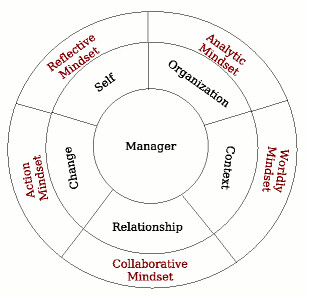In this article, I try to correlate the mindsets of the manager and the scientist’s problem solving abilities. A manager has to interact various different scenarios and bring in a balance to the system and environment he operates in. For example, a typical managerial problem involves the relationship of self, organization, local environment, people and results. Each brings in a fresh set of problems to operate on.
The Management Process
The manager needs to bring in a balance between the organization, self, people, local environment and results. Each of this needs a separate faculty of the mind and thus the five mindsets of the manager suggested in the shown figure. Only defined framework in a managerial process is the organization which has certain clarity and where a defined analytical mindset can be brought to place. However, other environmental forces that the manager needs to take decisions are all not so scientific problems. Thus, to a greater extent a managerial problem solving can be considered very similar to a discovery and understanding of the world as has been described in the “Scientist a problem solver”. However, many a times such problem solving can be to find the local optimality.
Laws from Data
A manager does not have any clear definition of problem. Most problems he faces needs to be analyzed from the data that is available to him as experiences. The experiences can be his or his fellow beings. A reflective mindset of a manager creates connections between the various signs that’s available to him. And, these connections may be generalized as the experience becomes firmer and clearer.
Representations
The management education is known for its 2 x 2 matrices and frameworks. Management being a subject that deals with significant alternatives needs to have representation methodologies which are simple and yet powerful enough to convey ideas. The interpretation of simple representations can be carried over to making complex decisions. However, if the problem cannot be isolated and brought into a simple framework it will be hard for a manager to keep track of the decisions which are multi-part, multi-step and can extend for longer periods of time.
Finding an Explanatory Model
Managers are known to look for frameworks which can explain the systemic nature of organization, society and environment. Psychologists and sociologists have come up with various explanatory models that explain human behavior and interaction. There may be large exceptions to the rule in such frameworks, but having a couple in one’s arsenal definitely makes the battle easier. A reflective and worldly mindsets bring in the required moderation in usage of these models.
Designing Good Experiments
Case analysis is considered an effective methodology for management education. Cases are essentially a focused definition of a real life situation. They come handy, as they bring in an analytical mindset to a real life problem which is normally hard to express in an analytical manner. As a manager, it’s important to create cases from critical real life incidents. The idea of a case should be so designed that from the look of it, it may sound an analytical exercise. However, the other faculties of a manager’s mind should be strong enough to filter such that the case looks as if it can be analytically solved. Designing cases can help a person use them in future, understand the intricacies of the situation and keep in mind what facts to use and what not to use and create problem isomorphs.
Problem Isomorphs
No two humans are the same. Hence, no two management problems are alike. Every case should be dealt with its uniqueness of characteristics. Does that necessarily mean that there can be no medical treatment as no two humans are alike in every respect? It can be seen with all their differences human beings of a same cultural upbringing have similarities. Organizations of similar sizes and domains behave alike. However complex an organization may be, certain processes in the organizations are alike. Hence, problems in one situation can be brought into another domain. A manager is a person who with his vast experiences should be able to make those correlations and identify the isomorphs. However, a worldly, collaborative and reflective mindset can make him see the differences within the isomorphs and compensate for the differences.
Experiments without Independent Variables
Most management problems have no variables known. What is known in is something needs to be achieved. An action orientation without analytical mindset would mean put more effort and results can be achieved. But, it’s also known that in a resource constrained world this is just wishful thinking. A manager can come up with manageable changes and study the effects on the output by going beyond the action mindset. Rather than identifying the input variables, changing intermediate processes can lead to better output maximization. This would mean better collaboration, people management and support of society. Searching for input variables is like finding out the cause of the problem. Many a times a satificing attitude of solving the problem with alternatives possible can be a worthwhile approach to consider.
The Manager as Satisficer
Managers are by definition satsficers. This has its positives and negatives. The benchmarks for most managerial processes are not known earlier. Hence, managers tend to propose estimates based on historical data and expected achievable margin. Once that’s met they take a satisficing attitude of making that as their
achievable target. Every re-engineering effort tends to challenge that satisficing target and achieve further. A good model and conducting right experiments backed by problem isomorphs should be well analyzed before taking a satisficing viewpoint of a management problem.

No comments:
Post a Comment